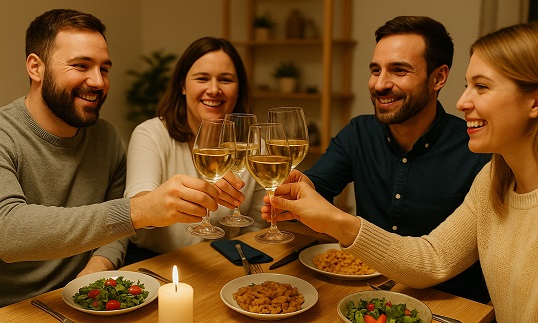
Dinner invitations in Germany are warm, deliberate, and full of quiet rituals. But if you’re not familiar with German table manners, conversation norms, and unspoken cues about when it’s time to leave, things can get awkward quickly.
This guide helps you navigate a dinner invitation with confidence – from your first greeting to the final goodbye.
Accepting the Invitation and Arriving On Time
First, punctuality. If dinner starts at 6:30 p.m., aim to ring the bell at exactly 6:30 – not 6:15, and definitely not 6:45. Germans see punctuality as respect. Arriving late without notice can be interpreted as inconsiderate, even among friends.
Bring a modest gift: a bottle of wine, flowers (avoid chrysanthemums and red roses), or chocolates are perfect. Offer it at the door with a simple thank you: “Vielen Dank für die Einladung.”
What Happens Before the Meal
Once inside, remove your shoes (unless told otherwise), greet the host and other guests politely – use titles unless invited not to – and wait to be shown where to sit or place your coat.
Pre-dinner drinks (Aperitif) are common and usually light. Join in, but pace yourself – this isn’t a party, it’s a meal.
The Rules of the Table
When the meal begins, follow the host’s cues. Do not start eating until someone says “Guten Appetit” or the host indicates the meal has begun.
- Keep your hands visible – rest your wrists on the table edge, not your elbows.
- Use your knife in your right hand, fork in your left – switching hands is less common.
- Wait for everyone to be served before digging in.
- Pass items like bread or salad before serving yourself.
- Finish everything on your plate if you can – it signals that you appreciated the meal.
Making Conversation: What’s Welcome (and What Isn’t)
Germans enjoy thoughtful, real conversation – but they don’t love idle small talk. Good topics include travel, literature, culture, current events, and food. Feel free to ask questions about the meal or ingredients – especially if it’s homemade.
Avoid heavy or divisive topics unless you know your hosts well:
- Politics (unless the topic is already on the table)
- Religion
- Salaries or personal income
- Jokes or sarcasm – humor is more understated
Ask questions, listen closely, and share in the conversation – the tone is often sincere and friendly rather than boisterous.
Toasting and Drinking Etiquette
Toasts are a central part of many German meals. The most common toast is “Prost!” – make eye contact as you clink glasses and take a sip.
If someone raises their glass and toasts the host or guest of honor, join in and echo the sentiment. Don’t start drinking before the first toast is made.
Water is served, but wine or beer is often expected. Don’t overdo it – moderation is valued.
Knowing When It’s Time to Go
Unlike some cultures where the evening stretches on for hours, German dinners have a natural arc. Once dessert is served, coffee poured, and the conversation slows, the host may clear the dishes or glance at the clock.
These are your cues.
Don’t wait to be asked to leave – say thank you, compliment the meal, and exit politely. A classic German phrase is: “Es war ein sehr schöner Abend. Vielen Dank.” (It was a lovely evening. Thank you very much.)
Follow-Up Etiquette
The next day, send a short thank-you message. A handwritten card is ideal for formal occasions, but a warm WhatsApp or email is perfectly acceptable for casual visits.
If the meal was especially elaborate or it was your first invitation, consider bringing or sending a small thank-you gift within a week.
Cultural Snapshot: What Table Manners Say About Germany
| German Value | Dinner Table Expression |
|---|---|
| Punctuality | Arriving exactly on time |
| Order | Clear seating, structured meals |
| Sincerity | Genuine conversation over small talk |
| Respect | Waiting to eat, using proper utensils |
| Moderation | Balanced drinking, not overstaying |
Key Takeaways
- Be exactly on time and bring a small gift
- Follow the host’s lead at the table
- Use polite, thoughtful conversation – avoid controversy
- Toast with eye contact and say “Prost!”
- Know when to leave and always thank the host after
Related Articles:
➡️ Invited to a German Home? What to Bring and How to Behave
➡️ What to Bring When Invited to a German Home
➡️ Shoes Off or On? Understanding German Indoor Etiquette
➡️ Staying Overnight: Rules, Rituals, and Respecting Your German Hosts
➡️ Punctuality in Germany: More Than Just Being on Time
